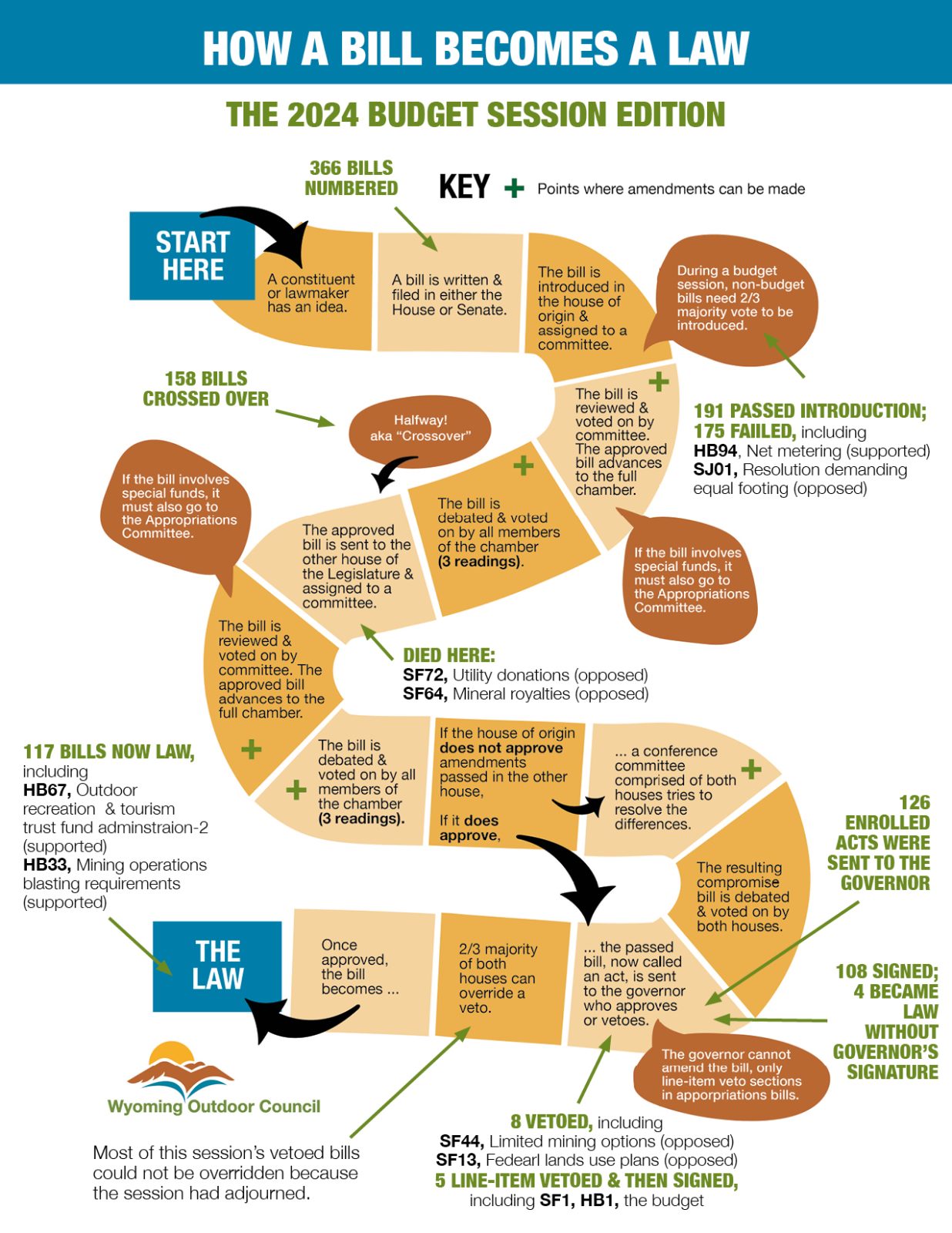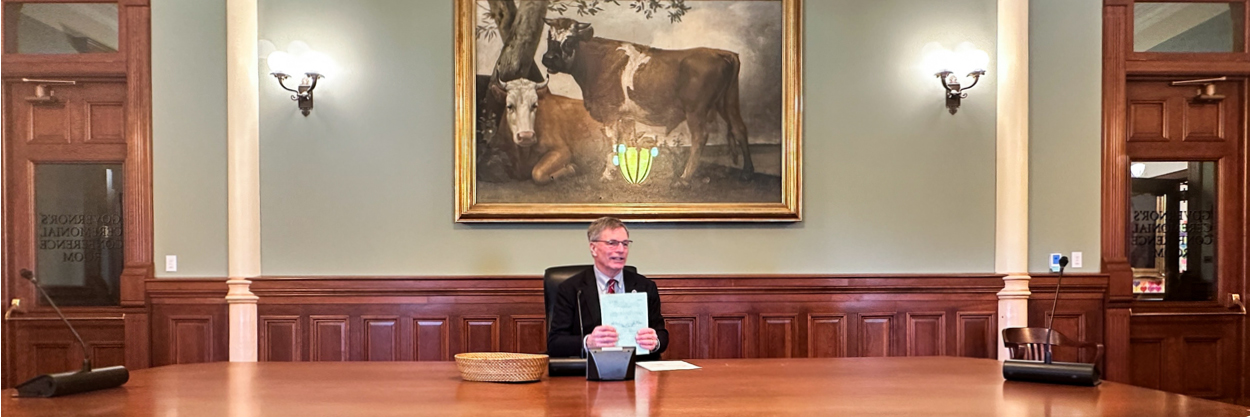When I last wrote to you on March 11, the House and the Senate had just adjourned. As of this past Saturday, all bills that made it to the governor’s desk have been signed or vetoed. We’re now in that brief, beautiful pause between the end of the budget session and the start of interim meetings. Thank you for following along and making your voice heard. We hope you continue to do so!
When we began this frenetic budget session in mid-February, 366 bills and resolutions were numbered for introduction. 125 of these made it through both chambers of the legislature and onto the governor’s desk. Of those, Gov. Mark Gordon vetoed eight, signed 109 into law, and let four become law without his signature. In the coming weeks and months, agencies will create the rules to implement these new laws. Most will go into effect on July 1, 2024, though some will go into effect sooner.
Below you’ll find a bill-to-law infographic that shows where some key conservation bills ended up. We’ve also listed some of the bills that have been signed into law or died since we last wrote. (To find out more about bills we’ve covered previously, read past Legislative Lowdowns at our State Legislature webpage.)

Themes from this year’s session included pushing back on the feds, concerns about utility rates and reliability, and reducing regulations, among others. Later this year, we’ll share our Conservation Vote Report, which will dive deeper into these themes and others — keep an eye out for it.
KEY BILLS THAT ARE NOW LAW
SF01, HB01 | 2025-2026 Biennial Budget
While passing a budget was the session’s primary goal, this year it was hardly a sure thing. The budget process was contentious, with late nights of discussion and over 300 amendments! Ultimately, a compromise budget (landing nearly halfway between what the House and Senate proposed) was passed by a slim margin in the final hours.
The budget was then sent to Gov. Gordon, who made line-item vetoes before signing it this weekend. The Legislative Service Office reported spending at $11.3 billion, with $3.4 billion coming from the General Fund (tax dollars) and the rest coming from the federal government and various state savings accounts.
Among the provisions that made it through were funding to staff state agencies that influence conservation; money to fight invasive grasses; and money to support both the state and local governments in finding and securing grants.
The sale of the Kelly Parcel directly to the federal government remains in the budget, but so do stipulations on its sale, the most concerning of which ties the sale to specific actions in the Rock Springs Resource Management Plan. We sincerely hope that the Governor can exercise his authority to ensure the sale goes through unencumbered by these stipulations.
HB36 | Natural Resource Protection Act | Opposed
This “fight the feds” bill attempts to give the governor the power to decide if federal laws or regulations regarding land management do not comply with federal laws — a role that, constitutionally, belongs to the federal courts. If the governor declares a federal action to be unlawful, the bill would prohibit state employees or funds from being used to enforce it.
SF114 | Contractor license-reciprocal recognition requirements | Supported
This bill requires local governments to grant reciprocity to contractor licenses and sets standards for these licenses. There are a number of federal grant programs that could benefit Wyoming’s residents and workforce if we had the contractor capacity. For examples, the Home Energy Rebates programs could bring over $70 million in to support Wyoming residents and businesses with upgrades that lower utility bills and increase efficiency.
KEY BILLS THAT ARE NOW DEAD
SF13 | Federal land use plans-legal actions authorized | Opposed
This “fight the feds” bill would have provided the state legislature $75 million in funds to sue the federal government in order to “protect the rights, powers and interests of the legislature.” Gov. Gordon vetoed this bill because it “represents a clear attempt to cross, blur, and trample the line of separation between our equal, but separate, branches of government” and because “it is not fiscally conservative.” Read the full veto letter here.
SF44 | Limited Mining Operations-Amendments | Oppose
This bill would have expanded the types of small mines that do not require a full mine permit under section 401 of the Environmental Quality Act. This would mean less oversight from the Department of Environmental Quality and no public comment requirements on new Limited Mining Operations that could now include gold, lithium, and rare earth metals in addition to the already exempted sand and gravel. Gov. Gordon vetoed this bill because its final version limited the state’s ability to generate revenue and gave state decision-making to the counties. You can read the full veto letter here. We anticipate that expanding Limited Mining Operations will be a focus of the Minerals committee during the interim.
For the final status of bills WOC has been following that are now law, click here. For the final status of bills WOC has been following that died, click here.
WHERE ARE WE HEADED?
On April 1, the Management Council will meet to assign topics to interim committees who will meet several times across the state throughout the year to learn about these topics and consider bills for the 2025 general session. These committee meetings are an excellent time to have your voice heard by testifying in person or via Zoom. You can find meeting times and agendas, sign up to testify, and watch meetings live on YouTube all on the legislative calendar.
Voting is an important conservation tool. Later in the year, we’ll share how legislators voted on conservation-related issues, which may help inform your decisions at the ballot box.
In the meantime, make sure you’re registered to vote. Wyoming law requires County Clerks purge their voter rolls every two years. If you did not vote in the 2022 election, you have been purged from the roles and need to re-register.
Many Wyoming races will be decided in the primary on August 20. If you are already registered to vote, you have until May 15 to change your party affiliation for the primary election. You can find key election-related dates here and information on how to register or re-register here.
Though we will pause weekly Legislative Lowdowns until next year, we will continue to keep you updates as issues arise. Please don’t hesitate to reach out with questions about this session or how to get involved in the interim. I look forward to meeting as many of you as possible as I am out and about across the state supporting conservation at interim meetings.
Finally, I just want to say thank you for speaking up for conservation this session. Your calls, emails, and texts to legislators made a difference. Additionally, your responses to my weekly emails buoyed my spirits during a challenging session and helped to keep us all going. Thank you for the support!
P.S. If you’ve appreciated our legislative coverage and would like to keep this vital work going through the interim, consider making a gift to the Outdoor Council. Your contributions enable year-round advocacy for all that we treasure about Wyoming.

